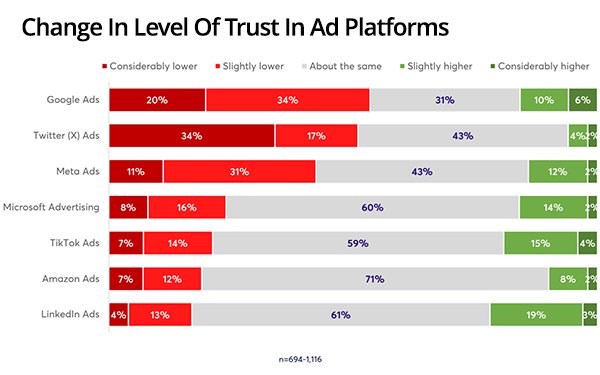Commentary
Trust In Google Ads Down, PPC Report Cites AI As Top Priority
- by Laurie Sullivan , Staff Writer @lauriesullivan, April 5, 2024

Implementing artificial intelligence (AI), machine learning (ML) and automation to further develop skills; improve return on ad spend, CPAs, conversions and leads; measurement of first-party data, attribution, removal of cookies, conversion tracking, and Google Analytics 4, are some of the most important themes for 2024, according to a recent report.
PPCsurvey.com released the new State of PPC Global Report 2024, with input from more than 1,100 PPC specialists worldwide, to better understand what search marketers focused on organic and paid media are thinking.
The findings analyze from the PPCsurvey.com study identify the greatest concerns, top priorities, spend data, automation insight and what marketers think are the most important trends for this year. The study was conducted between November 2 and December 24, 2023. Participants were offered incentives to complete the survey, such as early access to the report. The company also planted a tree for each survey entry through our partner Eden Reforestation Projects.
advertisement
advertisement
It's not surprised to see AI and automation as some of the most important themes for 2024 among paid search professionals, but trust has become a real concern among many.
When participants were asked if their level of trust in the ad platforms has changed compared with a year before, each platform received at least 694 responses. To clarify the word “trust,” the study added the clarification: By trust it mean the trust that is earned by being as transparent as possible and keeping the users’ and advertisers’ best interests in mind.
Trust in ad platforms has taken a hit in the past year, with only LinkedIn recording a net positive sentiment. Google at 54%, Twitter at 51%, and Meta at 42% recorded the largest deficits in trust. All three platforms have been struggling with issues such as trading user control for platform-side automation, reputation damage, presence of unwanted content, and general unreliability, according to the findings. Many thought platforms could do more to keep advertisers and agencies informed and feeling valued.
Respondents from South and Southeast Asia and advertisers hiring an agency were much more trusting in Google than the average. Some 41% and 35%, respectively, of these audiences said their level of trust in Google Ads increased vs. the 16% average.
Respondents with at least ten years of working experience were much less trusting of Google Ads: 63% said their level of trust decreased vs. the 54% average.
Measurement has become more complex in the age of cookie deprecation and difficult regulatory actions. There is likely to be a strong increase in Marketing Mix Modelling and high-level metrics such as Marketing Efficiency Ratio, where the challenges again are ones of skill, tech, and how to derive action, according to the the study.
When asked, what does success look like and how to measure it, 72% of respondents cited efficient growth--grow volume but only if efficiency targets are met. Some 19% want to improve efficiency, try to get more volume out of the same budget. about 7% will focus on aggressive growth, grow volume and accept a worse efficiency to allow for this growth. Only 2% plan to decrease spending and budgets while keeping volume at the highest possible levels.
Some 38% of marketers with at least two years of experience thought managing PPC campaigns is somewhat more difficult, 35% said about the same, 14% said somewhat easier, 11% much more difficult, and 2% said much easier.
The entire report can be found here.



